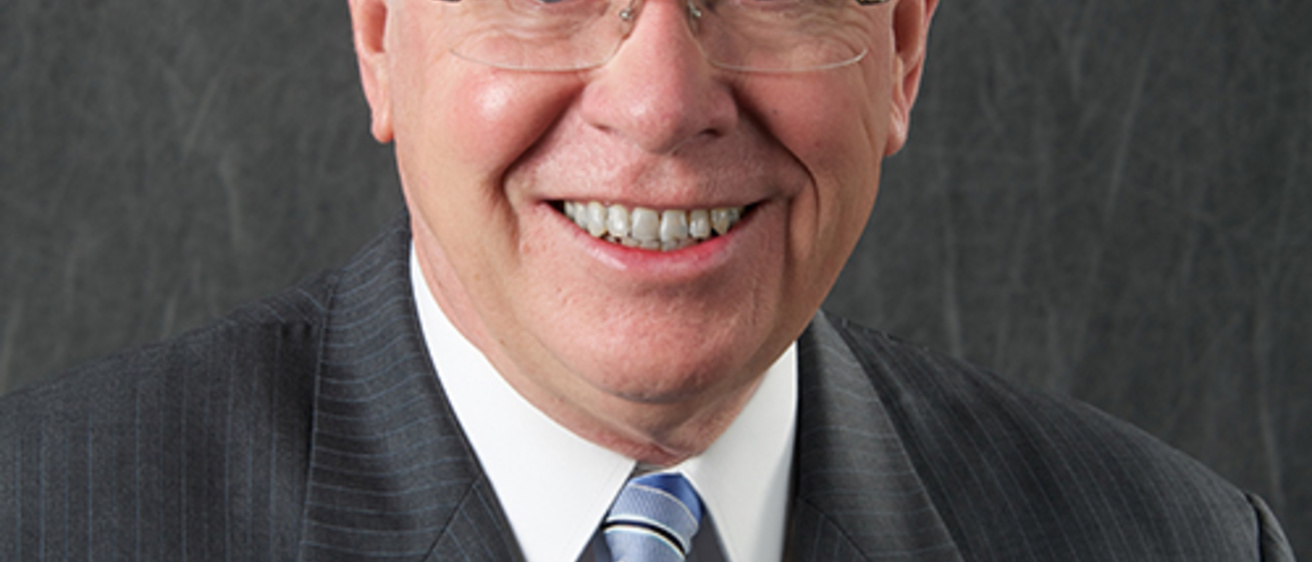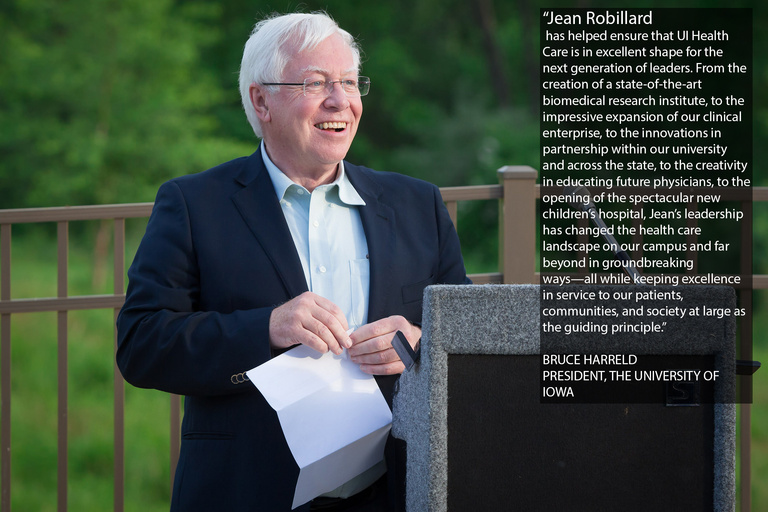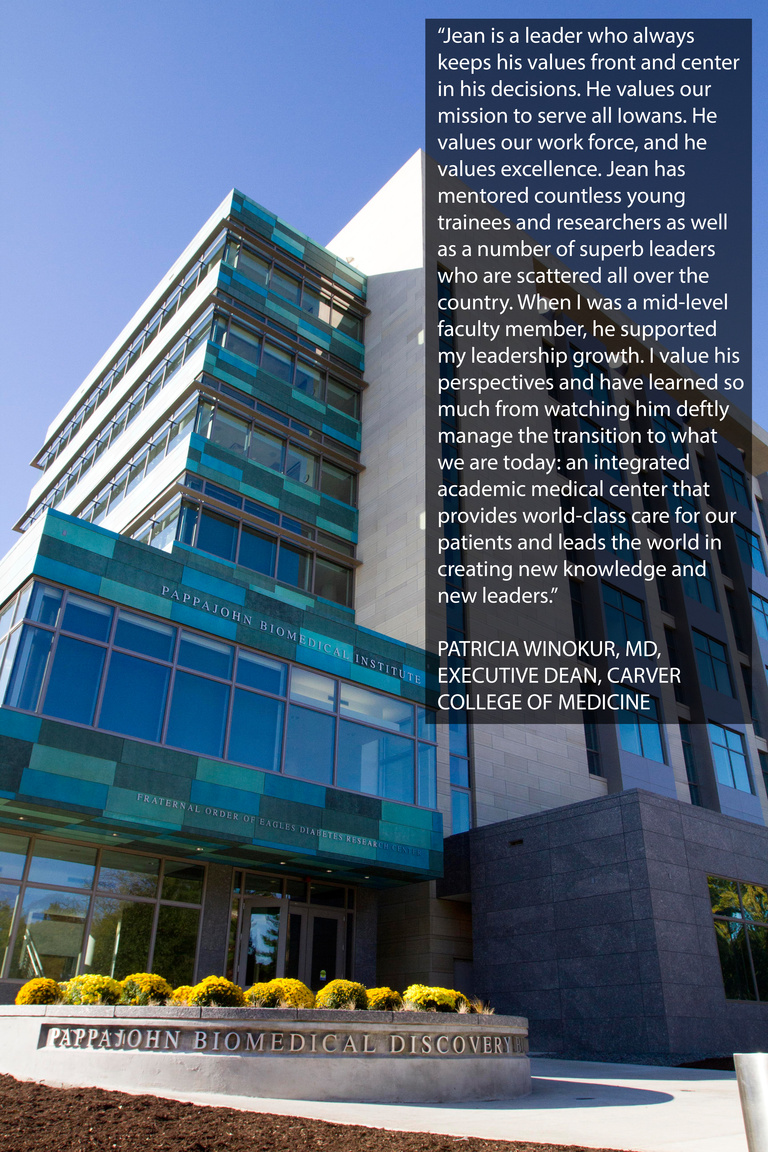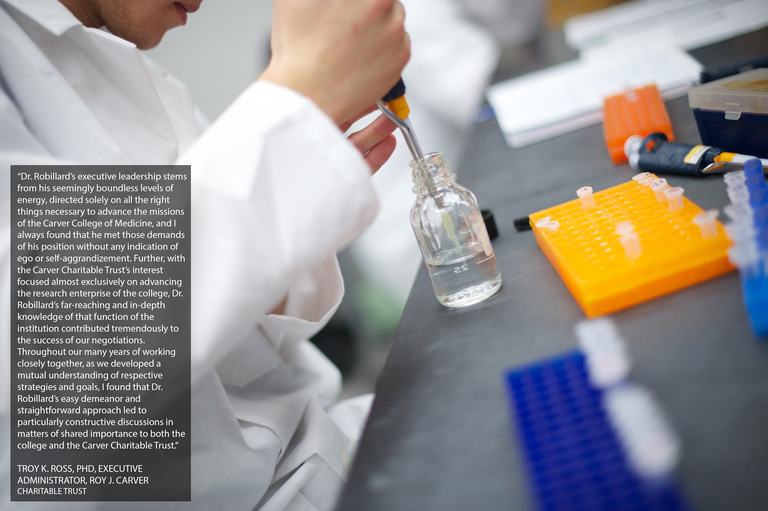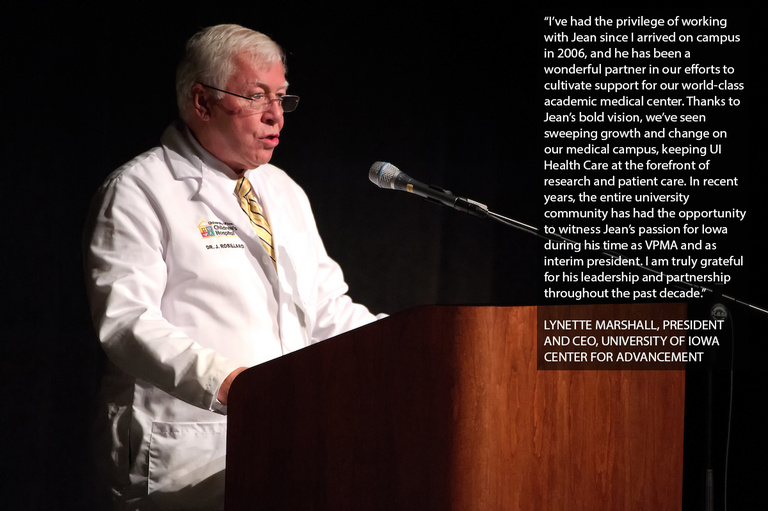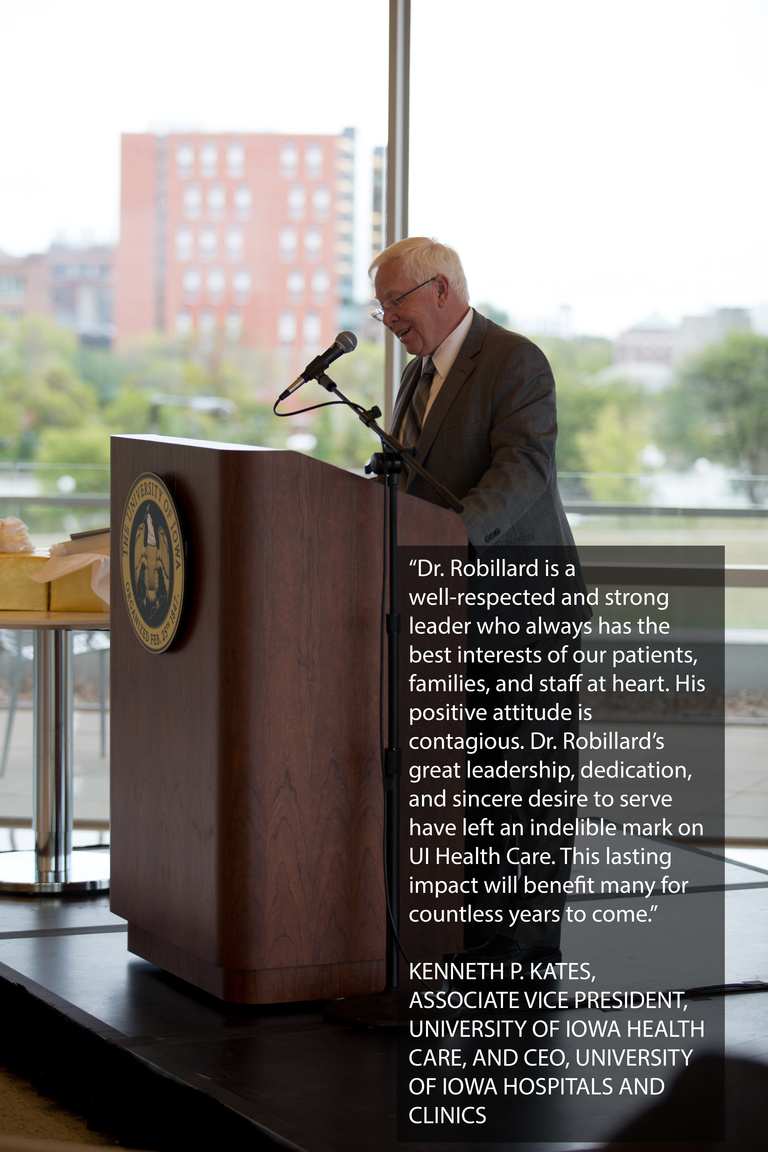In September 2016, Jean Robillard, MD (74F), announced he would step down from his role as UI vice president for medical affairs and dean of the Roy J. and Lucille A. Carver College of Medicine once a new leader takes over. University officials expect to announce the results of a nationwide search soon.
Robillard is not retiring—a pediatric nephrologist, he will maintain his primary faculty appointment in the Stead Family Department of Pediatrics as well as a secondary appointment in the Department of Molecular Physiology and Biophysics—but his announcement has brought renewed appreciation for his impact on the health care enterprise.
Under Robillard’s leadership as vice president for medical affairs, UI Health Care today stands as one of the few truly integrated academic medical centers in the country. Every aspect of the organization’s tripartite mission of education, patient care and service, and research has experienced remarkable change and growth.
Robillard has served the broader university as well. In addition to his role as vice president for medical affairs, he served as interim president of the UI from August to November 2015 while also chairing the search committee for the university’s 21st president, Bruce Harreld.
A native of Canada, Robillard earned his undergraduate and medical degrees at the University of Montreal. He completed medical internship and pediatric residency training in Montreal, followed by Medical Research Council of Canada-supported pediatric nephrology training at the University of California, Los Angeles.
Robillard first came to Iowa in 1973 to complete his pediatric nephrology fellowship. He joined the UI Department of Pediatrics faculty in 1974 but left a year later for a similar position at the University of Montreal.
He returned to Iowa in fall 1976 as an assistant professor and director of the pediatric nephrology division—and for the opportunity to collaborate with department chair Fred G. Smith, MD, whom Robillard had worked with at UCLA. For Robillard, it was the beginning of a 20-year period of pediatric research, patient care, and teaching.
“When I came here, the department had maybe 30 people,” Robillard says. “The pediatric nephrology division was small as well, so we were a close-knit group. We had a number of research grants as well as a center grant that was based here. In terms of patient care, we covered everything—the nephrology service but also the general pediatric service, and we attended the pediatric intensive care unit as well. It was a productive time with great people—the place was on the way up.”
The UI medical campus was poised for growth in the early to mid-1970s. University Hospitals, as it had been known for decades, became University of Iowa Hospitals and Clinics to better define the enterprise and its purpose. Under John Colloton’s leadership, new construction beginning in the mid-1970s marked the start of a phased capital program over the next two decades. The Willard L. and Susan Boyd Tower (1976), Roy J. Carver Pavilion (1978), John W. Colloton Pavilion (1982), and John Pappajohn Pavilion (1991) greatly expanded and updated existing patient care facilities.
Robillard ascended through the academic and administrative ranks in the pediatrics department, earning professor status in 1982 and being named vice chair of the department in 1987 under the leadership of Frank Morriss, MD.
In 1996, Robillard accepted the position as chair of the Department of Pediatrics at the University of Michigan Medical School and physician-in-chief of C.S. Mott Children’s Hospital.
The Michigan job was a unique leadership opportunity—one that ultimately prepared him for another return to Iowa, this time in February 2003 as the new dean of the UI Carver College of Medicine.
The college had just celebrated the opening of the Medical Education and Research Facility (MERF), which represented a major upgrade in research and teaching facilities. As dean, Robillard shepherded the construction and 2005 opening of an adjacent facility, the Carver Biomedical Research Building. The connected structures represented the first and second components of a three-stage plan to transform the medical school campus.
In January 2007, Robillard was named UI vice president for medical affairs in addition to his duties as dean of the Carver College of Medicine. The appointment marked the beginning of a game- changing plan—referred to as “One Vision, One Future”—to fully integrate the college, the hospitals and clinics, and the faculty practice plan into a more unified academic medical center.
Gary Fethke, PhD, former dean of the UI Tippie College of Business who was serving as interim president of the university at the time, made the appointment. Looking back, he notes that discussions with outside consultants, senior faculty and administrators, and members of the Board of Regents, State of Iowa (the governing body for the university), called attention to the need for a singular leadership structure over the operations and strategies of all UI Health Care entities.
“I became convinced that Jean was the right person to provide coherent leadership, and we were able to convince the Board of Regents that this was the right way to go,” Fethke says. “Ten years on, I believe we were right in making that assessment.”
Since Robillard announced he was stepping down from the VPMA role, colleagues have lauded his personality and perseverance.
Robillard “has amazing knowledge and a quick response to problems. He has made a significant contribution and change in the culture of health care at Iowa,” says venture capitalist and philanthropist John Pappajohn, who, along with his wife, Mary, are among the university’s most generous supporters. “He has the positive mental attitude to problem- solving and motivates his associates and employees to respond accordingly.”
Fethke cites Robillard’s intelligence and willingness to address complex problems.
“Leadership in medicine is not easy,” Fethke says. “It’s not enough to know science, clinical care, and education—you also have to understand one of the most complex financial environments in existence.”
Michael Welsh (74MD, 77R), professor of internal medicine, Howard Hughes Medical Institute investigator, and director of the Pappajohn Biomedical Institute, credits Robillard’s success—and that of UI Health Care—to his unyielding determination.
“One of his greatest strengths is his optimism,” says Welsh. “That attitude lets him set big goals. And, he believes that we will reach them. His optimism and leadership inspire that same belief in others. That’s what keeps our organization moving forward.”
In terms of next steps post-VP, Robillard plans to pursue projects aimed at fostering innovation in health care. As for the future, he is confident that UI Health Care will continue to excel.
“I have no doubt the next leader will be extraordinary and will move this organization forward at the same rate, if not faster,” Robillard says. “Iowa is a fabulous state—its people are true, honest, and transparent. And the university values collaboration. It’s never been about one person. It’s really about sharing responsibility and then sharing in the success. There are not many places like this in the country.”
